Papers by Angela Rose Black, PhD, MCST
Beyond White Mindfulness, 2022

(Under the Direction of Velma McBride Murry) This paper examines the extent to which personal res... more (Under the Direction of Velma McBride Murry) This paper examines the extent to which personal resources, personal and social contextual stressors, and social support impact the psychological functioning of African American mothers who were living alone, living with intimate partners or spouses, and living with co-residing grandmothers at the time of data collection. The subsample for the present study, N = 702, was selected from a larger study of 897 African American families participating in Wave 1 of the Family and Community Health Study (FACHS). Results revealed that these mothers were experiencing both anxious and depressive symptoms but not at clinical levels. Further, the predictive utility of correlates also differed as a function of family composition. Personal stressors explained more variance in the depressive symptomatology of solo mothers than partnered mothers. Racism was a significant predictor for solo mothers ’ anxious symptomatology but was not significant in predicting the psychological functioning of partnered mothers. Suggestions for research and clinical interventions are presented.

Objectives. Using African American women’s insights on their own health experiences, we explored ... more Objectives. Using African American women’s insights on their own health experiences, we explored how their daily life management was linked to the ‘‘strong Black woman’’ (SBW) script, and the health implications of that script. Methods. Using the search term ‘‘strong Black woman,’’ we identified 20 articles from African American women’s magazines and 10 blog sites linked to the SBW script and analyzed their content. We created thematic categories (role management, coping, and self-care) and extracted issues relevant to African American women’s health. Results. Adherence to the SBW script was linked to women’s daily life management and health experiences. Themes such as self-sacrificial role management (‘‘please the masses’’), emotional suppression (‘‘game face’’), and postponement of self-care (‘‘last on the list’’) incited internal distress and evinced negative health consequences. Conclusions. Scientists, activists, and health care professionals would be aided in forming initiativ...
Annals of the New York Academy of Sciences, 2019
Annals of the New York Academy of Sciences, 2019
Racial discrimination has been linked to allostatic load (i.e., cumulative biological stress) amo... more Racial discrimination has been linked to allostatic load (i.e., cumulative biological stress) among African American women. Coping is a central component of the stress response process. However, limited attention has been given to psychosocial processes involved in the stress response-critical for understanding biological pathways to health-in studies examining racial discrimination as a social determinant of health. We examined whether the superwoman schema (SWS), a multidimensional culture-specific framework characterizing psychosocial responses to stress
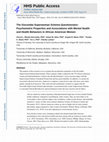
Issues in Mental Health Nursing, 2019
The purpose of this research was to examine the psychometric properties of the Giscombe Superwoma... more The purpose of this research was to examine the psychometric properties of the Giscombe Superwoman Schema Questionnaire. Three separate studies conducted with 739 African American women provided preliminary evidence that the Questionnaire's factor structure aligns with the Superwoman Schema Conceptual Framework and has good reliability. In addition, it is positively associated with perceived stress, depressive symptoms, using food to cope with stress, poor sleep quality, and physical inactivity. This study provides preliminary evidence to suggest that the Giscombe Superwoman Schema Questionnaire is psychometrically sound; Superwoman Schema is associated with health behaviors and psychological states that may increase risk for illness. African American women experience disproportionately high rates of stress-related chronic health conditions compared to non-Hispanic white women. They are more likely to be overweight or obese and have higher rates of diabetes, cardiovascular disease, and morbidity related to a variety of other stress-related conditions (Centers for Disease Control and Prevention, 2013). African American women are also at higher risk for stress-related physiologic aging compared to white women (Geronimus, Hicken, Keene, & Bound, 2006; Geronimus et al., 2010), even after adjusting for socioeconomic factors. Over the past twenty years, mounting evidence has demonstrated links between psychological stress and adverse health outcomes among African American women (
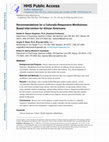
Complementary Therapies in Clinical Practice, 2018
Background and Purpose: African Americans are at increased risk for stress-related disparities. M... more Background and Purpose: African Americans are at increased risk for stress-related disparities. Mindfulness-based interventions are effective in reducing adverse outcomes; yet, racial/ethnic minorities are underrepresented in these interventions. Also, the development of culturally-responsive interventions has been mostly non-existent. Materials and Methods: Focus group and interview data were acquired following a four-week mindfulness intervention with African American women. Results: Using Brigg's (2011) mental health utilization model to guide analysis, several recommended culturally-responsive modifications emerged. Recommended modifications internal to the intervention included using African American facilitators, incorporating cultural values, using culturally-familiar terminology, and providing cultural resources. Suggested modifications to the intervention's external factors included offering the intervention within culturally-familiar settings. Individual-level factors to address were religious concerns, perceived benefits, and holistic health goals. Conclusions: Themes were used to propose a model toward the creation of a culturallyresponsive mindfulness-based interventions to guide culturally-relevant treatment modifications and improve underserved communities' engagement in these interventions.
Diabetes Spectrum, 2003
In Brief This article examines the influence of social and personal stressors on the physical and... more In Brief This article examines the influence of social and personal stressors on the physical and psychological functioning of African-American mothers with type 2 diabetes. The conceptual model presented proposes that exposure to multiple stressors may lead some African-American women to implement exaggerated coping behaviors to prove their competence, which in turn may prevent them from seeking and accepting the help they need. The negative consequences for health of this “superwoman syndrome” are emphasized. The moderating or buffering effect of social support and maternal psychological resources on the links between stressors, coping behaviors, and health are also considered.

Mindfulness, 2016
African American women experience stress-related outcomes due to race and gender (i.e., gendered ... more African American women experience stress-related outcomes due to race and gender (i.e., gendered race-related stress). Mindfulness meditation training (MMT), an intervention that facilitates increased self-regulation of stress, may reduce the effect of gendered race-related stress on African American women’s psychological and physical health. However, little is known about the perceived benefits and barriers African American women associate with MMT. The current study used the Health Belief Model to investigate how African American women’s (a) severity of symptoms, (b) expected benefits of MMT, and (c) perceived barriers to MMT contributed to their interest in MMT. Data from 12 African American women were analyzed with qualitative thematic analysis. Women reported a need for MMT given their gendered race-related stress experiences. Perceived benefits of MMT included easy accessibility, fit with existing daily activities, and positive health outcomes. Perceived barriers to use of MMT were incongruence with African American culture, stigma, caretaking tensions, and extensive time commitment. Themes are discussed with respect to their implications for increasing MMT engagement among African American women.
Women's Health Issues, 2005
Ecological theory was used to explore the pathways through which intimate relationship quality in... more Ecological theory was used to explore the pathways through which intimate relationship quality influenced health functioning among rural, partnered African American women. Structural equation modeling was used to analyze data from 349 women in Georgia and Iowa. Women's intimate relationship quality was positively associated with their psychological and physical health functioning. Support from community residents moderated this link, which was strongest for women who felt most connected with their neighbors and for women who believed their neighborhood to have a sense of communal responsibility. Future research should identify other factors salient to health functioning among members of this population.
Women & Health, 2009
Using data from 747 rural African American mothers, this study incorporated Role Accumulation the... more Using data from 747 rural African American mothers, this study incorporated Role Accumulation theory to test direct and indirect effects of stressors, coping behaviors, and role responsibilities on health functioning. Results indicated that demands emerging from financial strain were related to compromised mental health and decreases in mothers' use of effective coping strategies and role responsibility engagement. Conversely, mothers who effectively responded to stressors and fulfilled responsibilities to their children and communities experienced enhanced mental health, which in turn promoted optimal physical health. The results can inform research and intervention with African American women.
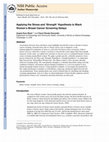
Stress and Health, 2012
Associations between stress and breast cancer highlight stressful life events as barriers to brea... more Associations between stress and breast cancer highlight stressful life events as barriers to breast cancer screening, increased stress due to a breast cancer scare or diagnosis, or the immunosuppressive properties of stress as a risk factor for breast cancer occurrence. Little is known, however, about how women's reactions to stressful life events impact their breast health trajectory. In this study, we explore how reactions to stressors serve as a potential barrier to breast cancer screening among Black women. We apply a gender-specific, culturally responsive stressprocess framework, the Stress and 'Strength' Hypothesis ("strength hypothesis"), to understand links between the 'Strong Black Woman role' role, Black women's stress reactions and their observed screening delays. We conceptualize strength as a culturally prescribed coping style that conditions resilience, self-reliance and psychological hardiness as a survival response to racerelated and gender-related stressors. Using qualitative methods, we investigate the potential for this coping mechanism to manifest as extraordinary caregiving, emotional suppression and selfcare postponement. These manifestations may result in limited time for scheduling and attending screening appointments, lack of or delay in acknowledgement of breast health symptoms and low prioritization of breast care. Limitations and future directions are discussed.
The effects of stressor pile-up, stress-coping behaviors, and role responsibilities on mental and... more The effects of stressor pile-up, stress-coping behaviors, and role responsibilities on mental and physical health functioning were examined among 747 African American mothers. Using the Mundane Extreme Environmental Stress (MEES) model of Family Stress theory, ...
This paper examines the extent to which personal resources, personal and social contextual stress... more This paper examines the extent to which personal resources, personal and social contextual stressors, and social support impact the psychological functioning of African American mothers who were living alone, living with intimate partners or spouses, and living with co-...
Family Relations, 2008
This investigation of the effects of stressful life events on rural African American women's rela... more This investigation of the effects of stressful life events on rural African American women's relationship well-being, psychological functioning, and parenting included 361 married or longterm cohabiting women. Associations among stressful events, socioeconomic status, perceived racial discrimination, coping strategies, psychological functioning, relationship well-being, and parenting were tested. Stressful events were related directly to diminished relationship well-being and heightened psychological distress and indirectly to compromised parenting. The results can inform research and intervention with African American women.

Complementary health practice review, 2010
In the current article, the authors examine the potential role of mind-body interventions for pre... more In the current article, the authors examine the potential role of mind-body interventions for preventing or reducing health disparities in a specific group—African American women. The authors first discuss how health disparities affect this group, including empirical evidence regarding the influence of biopsychosocial processes (e.g., psychological stress and social context) on disparate health outcomes. They also detail how African American women’s unique stress experiences as a result of distinct sociohistorical and cultural experiences related to race and gender potentially widen exposure to stressors and influence stress responses and coping behaviors. Using two independent, but related, frameworks (Superwoman Schema [SWS] and the Strong Black Woman Script [SBW-S]), they discuss how, for African American women, stress is affected by ‘‘strength’’ (vis-à-vis resilience, fortitude, and self-sufficiency) and the emergent health-compromising behaviors related to strength (e.g., emoti...
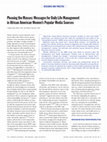
American Journal of Public Health, 2011
Objectives. Using African American women's insights on their own health experiences, we explo... more Objectives. Using African American women's insights on their own health experiences, we explored how their daily life management was linked to the “strong Black woman” (SBW) script, and the health implications of that script. Methods. Using the search term “strong Black woman,” we identified 20 articles from African American women's magazines and 10 blog sites linked to the SBW script and analyzed their content. We created thematic categories (role management, coping, and self-care) and extracted issues relevant to African American women's health. Results. Adherence to the SBW script was linked to women's daily life management and health experiences. Themes such as self-sacrificial role management (“please the masses”), emotional suppression (“game face”), and postponement of self-care (“last on the list”) incited internal distress and evinced negative health consequences. Conclusions. Scientists, activists, and health care professionals would be aided in forming ini...
Issues in Mental Health Nursing, 2019
The purpose of this research was to examine the psychometric properties of the Giscombe Superwoma... more The purpose of this research was to examine the psychometric properties of the Giscombe Superwoman Schema Questionnaire. Three separate studies conducted with 739 African American women provided preliminary evidence that the Questionnaire’s factor structure aligns with the Superwoman Schema Conceptual Framework and has good reliability. In addition, it is positively associated with perceived stress, depressive symptoms, using food to cope with stress, poor sleep quality, and physical inactivity. This study provides preliminary evidence to suggest that the Giscombe Superwoman Schema Questionnaire is psychometrically sound; Superwoman Schema is associated with health behaviors and psychological states that may increase risk for illness.

Racial discrimination has been linked to allostatic load (i.e., cumulative biological stress) amo... more Racial discrimination has been linked to allostatic load (i.e., cumulative biological stress) among African Ameri-can women. However, limited attention has been given to psychosocial processes involved in the stress response-critical for understanding biological pathways to health-in studies examining racial discrimination as a social determinant of health. We examined whether the superwoman schema (SWS), a multidimensional culture-specific framework characterizing psychosocial responses to stress among African American women, modifies the association between racial discrimination and allostatic load. We used purposive sampling to recruit a community sample of African American women ages 30-50 from five San Francisco Bay Area counties (n = 208). Path analysis was used to test for interactions while accounting for the covariance among SWS subscales using both linear and quadratic models. Significant interactions were observed between racial discrimination and four of the five SWS subscales. Feeling obligated to present an image of strength and an obligation to suppress emotions were each protective whereas feeling an intense motivation to succeed and feeling an obligation to help others exacerbated the independent health risk associated with experiencing racial discrimination. Our findings affirm the need to consider individual variability in coping and potentially other psychosocial processes involved in the stress response process, and offer several insights that may help elucidate the mechanisms by which racial discrimination gets "under the skin."
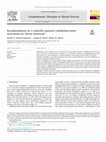
Complementary Therapies in Clinical Practice, 2019
Background: African Americans are at increased risk for stress-related disparities. Mindfulness-b... more Background: African Americans are at increased risk for stress-related disparities. Mindfulness-based interven-tions are effective in reducing adverse outcomes; yet, racial/ethnic minorities are underrepresented in theseinterventions. Also, the development of culturally-responsive interventions has been mostly non-existent.
Materials and methods: Focus group and interview data were acquired following a four-week mindfulness in-tervention with African American women.
Results: Using Brigg's (2011) mental health utilization model to guide analysis, several recommended culturally-responsive modifications emerged. Recommended modifications internal to the intervention included usingAfrican American facilitators, incorporating cultural values, using culturally-familiar terminology, and providingcultural resources. Suggested modifications to the intervention's external factors included offering the inter-vention within culturally-familiar settings. Individual-level factors to address were religious concerns, perceivedbenefits, and holistic health goals.
Conclusions: Themes were used to propose a model toward the creation of a culturally-responsive mindfulness-based interventions to guide culturally-relevant treatment modifications and improve underserved communities’engagement in these interventions











Uploads
Papers by Angela Rose Black, PhD, MCST
Materials and methods: Focus group and interview data were acquired following a four-week mindfulness in-tervention with African American women.
Results: Using Brigg's (2011) mental health utilization model to guide analysis, several recommended culturally-responsive modifications emerged. Recommended modifications internal to the intervention included usingAfrican American facilitators, incorporating cultural values, using culturally-familiar terminology, and providingcultural resources. Suggested modifications to the intervention's external factors included offering the inter-vention within culturally-familiar settings. Individual-level factors to address were religious concerns, perceivedbenefits, and holistic health goals.
Conclusions: Themes were used to propose a model toward the creation of a culturally-responsive mindfulness-based interventions to guide culturally-relevant treatment modifications and improve underserved communities’engagement in these interventions
Materials and methods: Focus group and interview data were acquired following a four-week mindfulness in-tervention with African American women.
Results: Using Brigg's (2011) mental health utilization model to guide analysis, several recommended culturally-responsive modifications emerged. Recommended modifications internal to the intervention included usingAfrican American facilitators, incorporating cultural values, using culturally-familiar terminology, and providingcultural resources. Suggested modifications to the intervention's external factors included offering the inter-vention within culturally-familiar settings. Individual-level factors to address were religious concerns, perceivedbenefits, and holistic health goals.
Conclusions: Themes were used to propose a model toward the creation of a culturally-responsive mindfulness-based interventions to guide culturally-relevant treatment modifications and improve underserved communities’engagement in these interventions